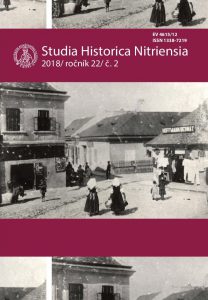Slovenskí evanjelici a. v. na Dolnej zemi v rokoch 1938 – 1945. (K vzťahu kultúrneho zázemia a politiky v čase druhej svetovej vojny)
Slovak Lutherans in the „Lower Land“, 1938 – 1945 (To the Relation Between Cultural Environment and Politics in the Times of the World War II).
Author(s): Anton Hruboň, Peter MičkoSubject(s): Cultural history, Political history, Social history, International relations/trade, Nationalism Studies, WW II and following years (1940 - 1949)
Published by: Univerzita Konštantína Filozofa v Nitre, Filozofická fakulta
Keywords: Foreign Slovaks; Lower Land; Lutherans; Slovak State; World War II;
Summary/Abstract: During the World War II Slovak communities in the „Lower Land“ (Dolná zem/Alföld) gained experiences with new states and political regimes. Due to aggression of Hungarian Kingdom which, as a German ally, annexed parts of Czechoslovakia, Romania and Yugoslavia in 1938 – 1941, a large part of Lower Land Slovaks temporarily became Hungarian citizens. Other groups of ethnic Slovaks lived in Romania, Ustasha Croatia, occupied territories of Serbia and Bulgaria during the wartime period. Conditions for national and religious life of these communities differed depending on national policy of their new motherlands and local specifics in which they coexisted with other nations and nationalities of this multicultural region. Despite a resolute stance of Slovak Lutherans in Slovakia towards the ruling Hlinka´s Slovak People´s Party´s catholic-profiled regime, Lutherans who were a majority among the Lower Land Slovaks did not always share moods of their fellow believers from historical homeland of their ancestors. Lutheran Slovaks in Hungary, Yugoslavia, Romania and Bulgaria had not maintained a close contact with the Slovak Republic and its regime. Because of this factor, Hlinka´s Slovak People´s Party´s regime could not directly influence the Lower Land Slovaks and exert political or ideological pressure on them. Presented study analyzes to what extent did the unenviable position of Slovak Lutherans in Slovakia mirror in the life of the Lower Land Slovaks, in their perception of Hlinka´s Slovak People´s Party and in their attitudes to the Slovak statehood. Taking the local national, cultural and religious specifics of the Lower Land into consideration, it also debates the question why the Lower Land Slovak communities, in general, did not show a passionate pro-regime activism and joy over the independent Slovak State, why they held a neutral, negative or not clearly profiled stance to the political issues regarding the “New Europe” instead and why the traditional cultural aspects like Lutheran faith played a bigger role within their identity than a wartime nationalism.
Journal: Studia Historica Nitriensia
- Issue Year: 22/2018
- Issue No: 2
- Page Range: 335-361
- Page Count: 27
- Language: Slovak

